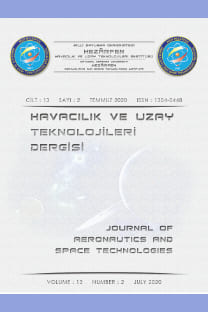A new particle swarm optimization method for the path planning of UAV in 3D environment
3 Boyutlu ortamda yol planlamasi için kullanilabilecek gelişmiş parçacik sürü eniyileme yöntemi
___
- [1] Eberhart, R. C., Kennedy, J.: A new optimizer using particle swarm theory. Proc. 6th Int. Symp. Micromachine Human Sci., Nagoya, Japan, pp. 39– 43, (1995)
- [2] Valle, Y., Venayagamoorthy, Mohagheghi, G. K., S., Hernandez, J.-C., Harley, R. G.: Particle swarm optimization: basic concepts, variants and applications in power systems. IEEE Trans. Evol. Comput., vol. 12, no. 2, pp. 171-195, (2008)
- [3] Shi, Y., Eberhart, R.: Parameter selection in particle swarm optimization. Proc. 7th Annual Conf. on Evol. Prog., pp. 591-601, (1998)
- [4] Higashi, H., Iba, H.: Particle swarm optimization with Gaussian mutation. Proc. of the IEEE Swarm Intell. Symp., pp. 72 – 79, (2003)
- [5] Stacey, A., Jancic, M., Grundy, I.: Particle swarm optimization with mutation. Proc. of the IEEE Congr. Evol. Comput., pp. 1425-1430, (2003)
- [6] Pant, M., Thangaraj, R., Singh, V. P., Abraham, A.: Particle swarm optimization using Sobol mutation. IEEE 1st Int. Conf. on Emerging Trends in Eng. and Tech., pp. 367-372, (2008)
- [7] Andrews, P. S.: An investigation into mutation operators for particle swarm optimization. IEEE Congr. Evol. Comput., pp. 1044-1051, (2006)
- [8] Zavala, A. E., Aguirre, A. H., Diharce, E. R. V., Rionda, S. B.: Constrained optimization with an improved particle swarm optimization algorithm. Int. J. Intell. Comput. and Cybern., vol. 1, no. 3, pp. 425- 453, (2008)
- [9] Jia, D., Li, L., Zhang, Y., Chen, X.: Particle swarm optimization combined with chaotic and Gaussian mutation. Proc. of the 6th World Congr. Intell. Cont. Auto., pp. 3281-3285, (2006)
- [10] Wu, X., Cheng, B., Cao, J., Cao, B.: Particle swarm optimization with normal cloud mutation. Proc. on the 7th World Congr. Intell. Cont. Auto., pp.2828-2832, (2008)
- [11] Chen, J., Ren, Z., Fan, X.: Particle swarm optimization with adaptive mutation and its application research in tuning of PID parameters. 1st Int.. Symp. Syst. Cont. Aerospace and Astronautics, pp.990-994, (2006)
- [12] Yang, M., Huang, H., Xiao, G.: A novel dynamic particle swarm optimization algorithm based on chaotic mutation. IEEE 2nd Int. Workshop on Knowledge Discovery and Data Mining, pp.656-659, (2009)
- [13] Liu, J., Fan, X., Qu, Z.: An improved particle swarm optimization with mutation based on similarity. 3rd Int.. Conf. Natural Comput., pp. 824- 828, (2007)
- [14] Biao, C., Zhishu, L., Die, F., Jian, H., Peng, O., Qing, L.: Mutated fast convergent particle swarm optimization and convergence analysis. IEEE 1st Int. Conf. on Intell. Netw. Intell. Syst., pp. 5-8, (2008)
- [15] Ozcan, E., Mohan, C. K.: Particle swarm optimization: Surfing the waves. Proc. 1999 Congr. Evol. Comput., Washington, DC, pp. 1939–1944, (1999)
- [16] Clerc, M., Kennedy, J.: The particle swarmexplosion, stability, and convergence in a multidimensional complex space. IEEE Trans. Evol. Comput., vol. 6, no. 1, pp. 58–73, (2002)
- [17] Shi, Y., Eberhart, R.: A modified particle swarm optimizer. Proc. of the World Congr. Comput. Intell., pp. 69–73, (1998)
- [18] Pant, M., Radha, T., Singh, V. P.: A New Diversity Based Particle Swarm Optimization using Gaussian Mutation. Int. J. Math. Modeling, Simulation and Appl., 1(1), pp. 47-60, (2008)
- [19] Misiti, M., Misiti, Y., Oppenheim, G., Poggi, J-M.: Wavelets and Their Applications, ISTE Ltd., USA, pp. 8-12, (2007)
- [20] Farin, G.: Curves and Surfaces for Computer Aided Geometric Design; A Practical Guide, Academic Press, Inc., pp. 41-42, (1993)
- ISSN: 1304-0448
- Yayın Aralığı: 1
- Başlangıç: 2003
- Yayıncı: Dr. Öğr. Üyesi Fatma Kutlu Gündoğdu
A new particle swarm optimization method for the path planning of UAV in 3D environment
Özgür AKSOY, MUZAFFER KAPANOĞLU
Sürtünme karıştırma kaynağı ve havacılık ve uzay endüstrisindeki uygulama alanları
Göl yüzeyi değişimlerinin belirlenmesinde farklı dijital görüntü işleme tekniklerinin kullanılması
